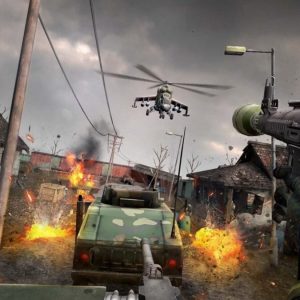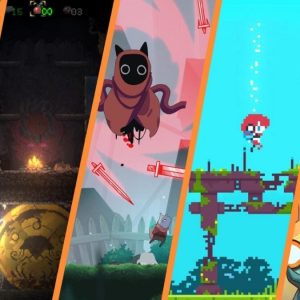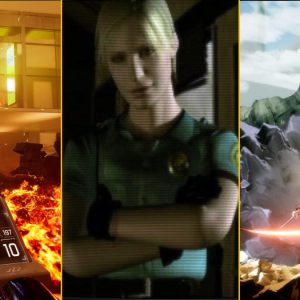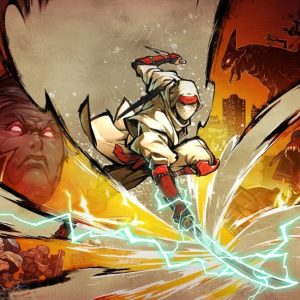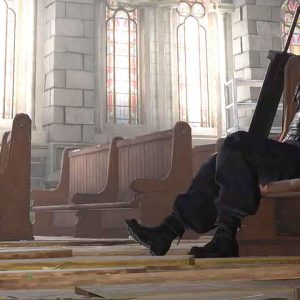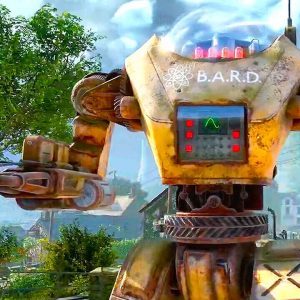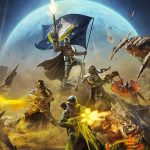At roughly 35 hours in with seemingly plenty more to go, GreedFall is almost everything I want out of a big, juicy, old-school RPG. While it’s still lacking a lot of polish, the exciting, enjoyable combat and excellent, complex quest writing bring it very close to that winning formula of a mid-2000s BioWare game – something developer Spiders has previously aimed for but missed with its last couple of releases. GreedFall’s sprawling adventure finally seems to have landed on the right foot, and so far it has been worth the wait.
Comparisons to The Witcher series and Dragon Age: Origins are easy to make as you traverse its wild, semi-open environments. Spiders has always been great at worldbuilding, and the Age of Discovery-inspired fantasy setting GreedFall throws you into doesn’t disappoint in that regard. From the moody, muddy streets of Serene that evoke Paris or London in the 1700s, you set sail for the mysterious, volcanic island of Teer Fradee. While exploring it, you’ll take steel and gunpowder to all manner of foes, human and mythical, while uncovering a compelling mystery that, unfortunately, reveals some of its best secrets a bit too early for my taste.

The island itself is full of beautiful, diverse, but still-grounded environments that look lovely rendered on my GTX 1070, though I did experience some inconsistent frame rates here and there. The roadside camp that serves as a loading area between major zones, in particular, chugged really badly. But these places serve as the backdrop for a many-layered, morally complex tale about colonization, religion, politics, and worlds colliding that I’m eager to see the end of.
“
The characters aren’t quite as artfully rendered, which is where the rough edges of GreedFall become most apparent. In striving for realism, its characters definitely got placed in a bit of an uncanny valley that may have been avoidable with slightly more stylized models. The facial animations have certainly gotten better since Spiders’ last game, The Technomancer, but overall most conversations are still lent a bit of an eerie, robotic feel thanks to the stilted way the pirates, colonial governors, and native warriors look and move. On the other hand, the outfits they wear are detailed and wonderfully evocative, and the voice acting, at least for most of the main characters, is pretty high quality.
The biggest exception to the otherwise strong voice work is the fictional accent created for the natives. Every time they speak, I can really tell it’s artificial, and it’s used inconsistently from one character to another. The performances themselves aren’t bad, but they’re dragged down by this attempt to do something ambitious when just giving them a real-world accent probably would have worked better in practice. There are a couple other small things that took me out of the fantasy, too, like the fact that “continental” building interiors and guard armor are re-used for all three of the colonial factions, which detracts from their ability to present a unique identity.
In writing, however, every faction has a clear personality and set of objectives that affect how they relate to one another and to the natives. From the scientifically-minded Bridge Alliance to the fanatical, evangelizing Theleme, an intriguing and complex political web is woven that you’re obliged to navigate in the course of your quest. The magic-wielding natives of Teer Fradee are also presented with a lot of depth and nuance, as there are many tribes that don’t share all of the same customs or even agree on what should be done about the colonizers. It’s very hard to divide this world into “good guys” and “bad guys”, and there is no morality system, which forced me to make a lot of interesting decisions based on my own value judgments. I love it when an RPG doesn’t slap me on the wrist arbitrarily for acting on my own idea of justice.
“
The quests are exceptionally well-written pretty much across the board, and often made those interesting decisions I mentioned all the more difficult. They tactfully handle some very heavy themes that I haven’t seen tackled in other story games, like the institutionalized abuse of soldiers in the military and forced re-education of natives. Teer Fradee is rarely a cheerful place, and similarly to The Witcher 3, the best you can do sometimes is try to find the least terrible outcome to a very dark situation.
Backing all of this up is a fun, flowing, challenging tactical combat system that I still haven’t gotten enough of. Combat was by far the weakest pillar of Spiders’ past games, so this is a monumental improvement. I actually look forward to battles instead of dreading them, which let me dodge and roll around both human and monstrous opponents, firing away at their armor with a musket or pistol before going in to finish the kill with some showy, swashbuckling saber work.

The pacing is great. The animations are eye-catching and show a lot of attention to detail. There’s a good mix of mooks you can mow down to feel powerful, and genuinely challenging bosses that will test your composure and reflexes. There’s even a whole magic system I haven’t even touched yet with my warrior/rogue hybrid build. You don’t have a lot of control over what your two AI party members do, so it’s lacking a bit of the tactical element of a game like Dragon Age: Origins. But what’s here is so well done that I didn’t feel that sting too often.
With all there is to do, I may be only about halfway through this behemoth of an RPG. But I’m enjoying myself just about every step of the way. The Technomancer was disappointing, but I still wanted to see other games try the ambitious things it was attempting with more success – GreedFall delivers on that promise. There are still glitches, awkward character models, immersion-breaking re-use of assets, and an overall lack of polish that keep it from threatening Geralt’s crown, and I’ll need to find out how the story wraps up before I can pass final judgment on it. But I can already say this is going to be a crowd-pleaser for those of us who still shake our canes and talk about how the genre peaked a decade ago. We may have to eat our words before long.






